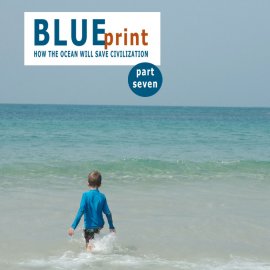Inter-Generational Equity
-
English
-
ListenPause
[intro music]
Welcome to World Ocean Radio…
I’m Peter Neill, Director of the World Ocean Observatory.
We tend to view the world horizontally, a wide spectrum, surround-sound panorama of life in which we participate as actor, director, producer, and audience. But there is also a secondary perspective—vertical—that looks up and out to our personal aspirations and down and in to our thoughts and fears. And finally, there is a third perspective, in time, through which we look backward into our history and forward into our future, by application of inquiry and imagination. Compound attendance in this theatrical performance, and you have the sum total of the human drama—sometimes we praise the production, sometimes we pan.
In discussing the meaning of fair distribution of world assets and access, we prefer the horizontal projection of the present; it seems enough of a challenge to deal with that reality and ignore or postpone the others. It is hard out there, and harder still in this time of unimaginable change. Here is a list of fundamental confrontations to our way of life in this moment: climate change; increased storm and weather impact; drought and fire; water and food scarcity; community evacuation and dislocation; pandemic disease; failed governmental response; unemployment; disrupted education at every level; confused and delimited prospects for political, social, and financial equilibrium and forecast. The list goes on and the level of outcome and anxiety increases for most at an exponential, debilitating rate of uncertainty and outcome.
The biggest inequity of them all is not that we deprive others of our generation of fair and just distribution of wealth and health today, but that we ignore the obvious damage to our children, a conscious legacy of denial of the best of our knowledge and experience to those who follow, an equitable, negative inheritance for own pro-creation and that of millions of others tomorrow.
What kind of society is it that sacrifices its children to recalcitrance and ignorance? That relegates their future to compromise and disappointment before it even begins? A student beginning high school or college today is faced with institutions that have not yet discovered a way beyond reaction to shifting conditions to adapt to a new physical and pedagogical way to provide them the knowledge and skills to move forward toward occupations and professions that are also changing with comparable speed. Those suddenly unemployed have no assurance that their jobs will recover or that their experience will be relevant to what emerges from the confusion.
Again, the ocean provides a natural example. We have seen the almost immediate collapse of marine resources if over-fished or polluted or deprived of the safety of adequate nutrition and growth by indiscriminate, unsustainable behavior. Coral reefs, mangroves, and coastal wetlands are all powerful examples of how such actions compromise and destroy habitat for incubation and thriving of fish stocks through acidification and sea temperature rise, landfill and indiscriminate development. Dams prevent ocean species from their natural return to brackish streams and fresh water ponds to spawn. Natural protection is removed to leave young species vulnerable to predators. Re-production is delimited to the extent that it cannot replace mature species harvested for food and fertilizer. And much of the harvest is wasted as dead protein with no immediate financial return, by-catch thrown overboard and useless.
One might dismiss those inequities as natural and normal, but they are not, and their dismissal by us is justification for actions that deprive natural value from the cycle of life. If we deprive ensuing generations of this value, we will soon see our children suffer just as we have seen the cod or the herring disappear from the food chain and bring vital coastwise communities, families, and cultural institutions to an end.
We have been warned. The alarms have long sounded. The responsibility is there for the taking. There are solutions based on alternative behaviors. There is technology, capital, and hope available to meet the challenge. We can be smart. We can be fair. We can be just. We can be equitable in our decisions going forward. We can reinvigorate and re-stage the human drama unless we have decided, in a tragic act of misunderstanding and failed intention, to abandon the theater and all its players to inundation by the waters of ignorance, forgetfulness, and darkness.
We will discuss these issues, and more, in future editions of World Ocean Radio.
[outro music]
This week on World Ocean Radio: part seven of the multi-part BLUEprint series. In this episode "Inter-Generational Equity" we ask listeners to think about the inequity of the damage that we are leaving for our children: a legacy of denial and a negative inheritance for future generations. The "BLUEprint Series: How the Ocean Will Save Civilization" outlines a new and sustainable path forward, with the ocean leading the way. This week we warn of the perils of continuing to ignore the alarm bells that have been sounding for years, and the ways that we can change our way forward through solutions based on alternative behavior.

About World Ocean Radio
Since 2009, a weekly 5-minute podcast covering a broad spectrum of ocean issues from science and education to advocacy and exemplary projects. World Ocean Radio, a project of the World Ocean Observatory is available for syndicated use at no cost by college and community radio stations worldwide. Contact director@thew2o.net if you are interested in becoming an affiliate or know of a radio station that should be broadcasting these episodes each week.
Image
Photo by Chen Mizrach on Unsplash
- Login to post comments



